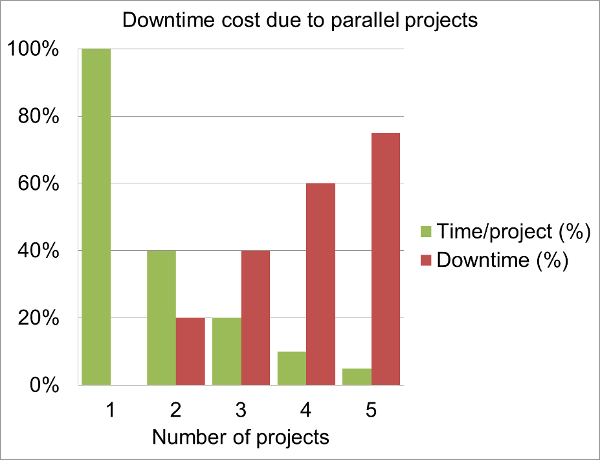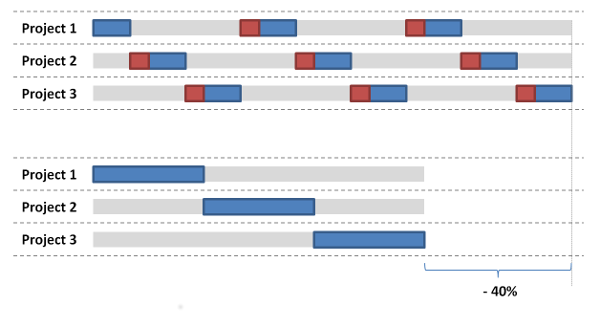In order to achieve higher efficiency you need to prioritize. You cannot do everything at once, everyone knows this. Yet many organizations are trying to work with too many projects at a time. The list of projects is getting longer and less important projects are still remaining on the list.
Identifying the projects you should be working on is equally about identifying the projects you should not be working on and remove from the list.
The more projects and tasks a person is assigned to handle the more inefficient the work, due to downtime, i.e. the time it takes to change the task and find a new focus. Studies show that it can take between 15-30 minutes each time you change tasks before you can work efficiently again. When it comes to system development, it can take considerably longer, especially if the task is complex.

If you work on only one project you can devote 100% of your time to it. However, if you work on two projects in parallel, you can lose as much as 20% of your time in downtime. At three parallel projects, you can lose as much as 40% of your time in downtime.

The Manufacturing industry is well aware of this and has developed methods for better efficiency such as Lean Production, Just-In-Time, Kaizen, 5S, etc. But when it comes to IT projects and system development, it is not usual. And for the most part not spread to the entire organization, such as the manufacturing industry. It is possible to work more systematically with IT projects but to achieve that top management need to take a bigger responsibility, both strategically and tactically.
When working on multiple projects at the same time, the organization perceives the work as more efficient because more things are going on, but it is only an illusion. By daring to take the decision to work while focused on one project at a time you can achieve high efficiency within the organization.
When it comes to IT projects, usually the same key people have the skills for all projects. If you are still trying to please everyone, there will not be enough time, resulting in:
- Key persons need to divide their time between projects, which can lead to stress.
- The project is delayed and costs higher than expected.
- The organization loses interest because new important projects are begun.
You will gain several benefits by working focused on one project at a time:
- The benefits are achieved faster
- The cost decreases
- The stress of the involved personnel decreases
- The quality increases
- The interest of the organization increases
Prioritize the projects portfolio and have the courage to remove less important projects. You will create great benefits and efficiency within the organization!
www.priotice.se



